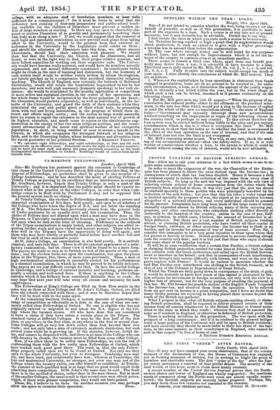PROPER TAXATION OF BRITISH SUBJECTS ABROAD.
Sin—Allow me to call your attention to a fact which seems to me to re- quire some consideration.
In order to meet the exigencies of the war, the Chancellor of the Exche- quer has been pleased to throw the onus thereof upon the Income-tax ; in consequence of which that tax has been doubled. Hence it becomes a duty in common equity to enforce the collection of the same from every class of British subjects. So long as the said tax was imposed with the sole view of relieving certain articles of home consumption from the duties which had previously been attached to them, it was very just that the new tax should be confined specially to those parties who were principally benefited by the reduction of the said duties; but now that this tax takes a wider range and is doubled specially for purposes of war, the object of its imposition becomes altogether of a national character, and every individual should be assessed for its amount. Complaints have long been made of the large sums of money annually expended abroad by British subjects, many of them enjoying pay, pensions, and other emoluments, who contribute nothing either directly or indirectly to the taxation of the country, unless in the case of pay, half- pay, or pension, in which cases, I believe, the amount of Income-tax is al- ways deducted. But there are a vast number of British subjects residing abroad, or claiming British protection, who have vested all their capital in foreign funds, railways, or other securities : the Income-tax to them is no burden, and its increase for purposes of war of none account. Now, Sir, I consider this immunity to be a very great injustice to those upon whom this tax presses so heavily at home. British protection to persons residing abroad costs the country very dear; and it is but just that those who enjoy it should bear some share of the popular burdens.
It will be in your recollection that a certain Don Pacifico, a British subject or claiming British protection, resided for some time at Athens ; that he came into collision with the Greek authorities, and called upon the British Govern- ment to interfere in his behalf ; and that in consequence of such interference, we were brought into serious difficulty with Greece, and were on the eve of a grave rupture with France ! It would be curious to ascertain whether the said Don Pacifico ever contributed one shilling to the British treasury, or to that of any of the Colonies or Dependencies of Great Britain.
Whilst the Funds are daily going down in consequence of the drain of gold, it would be desirable to know how much of this capital is abstracted by Bri- tish subjects for investment in foreign securities, not only with the view to a higher rate of interest, but for the very purpose of avoiding the payment of this tax. Mr. Pitt foresaw the possible decline of the English Funds `.f exposed to the Income-tax, and absolved them from its operation. To be relieved from six per cent on income is a great temptation, and I have no doubt that many thrifty persons are rejoicing in having placed their income beyond the reach of the British tax-gatherer.
What I propose is this—that all British subjects residing abroad, or claim- ing British protection, shall be required to deliver attested returns of their income from all sources whatsoever to the British Minister or Consul accre- dited to the state in which they reside ; whereon they shall be assessed the same as if resident in England, or otherwise be debarred of British protection. There is nothing invidious in this proposition. The war opens with the prospect of a long continuance ; and if it be confined to the present bellige- rents a large portion of the Continent will still be open to British residents; and most assuredly they should be made liable to their fair share of the bur- dens, in the same manner as their countrymen in England, who cannot be said in this respect " to live at home at ease." A BRMSLI SUBJECT RESIDING ABROAD.


























 Previous page
Previous page